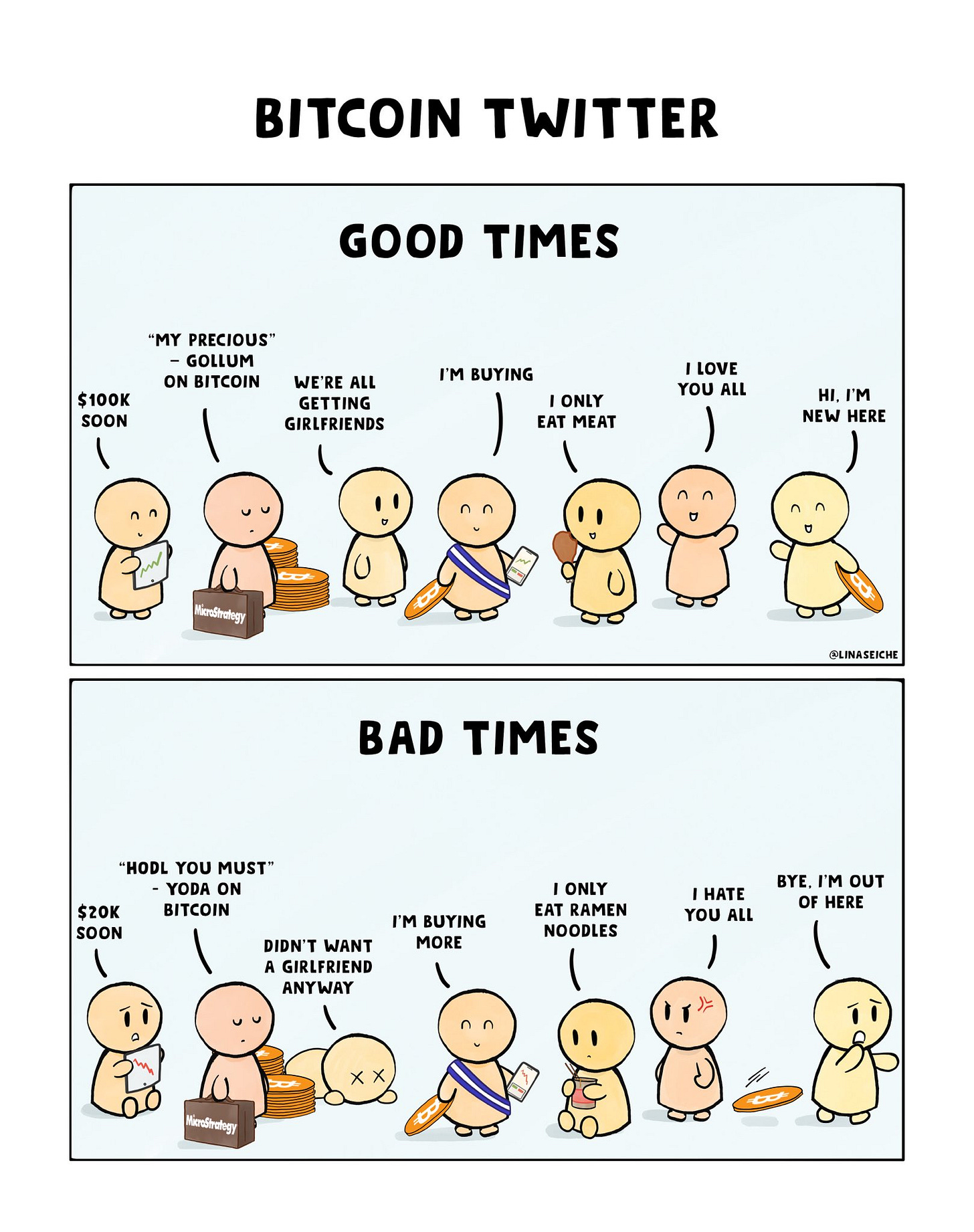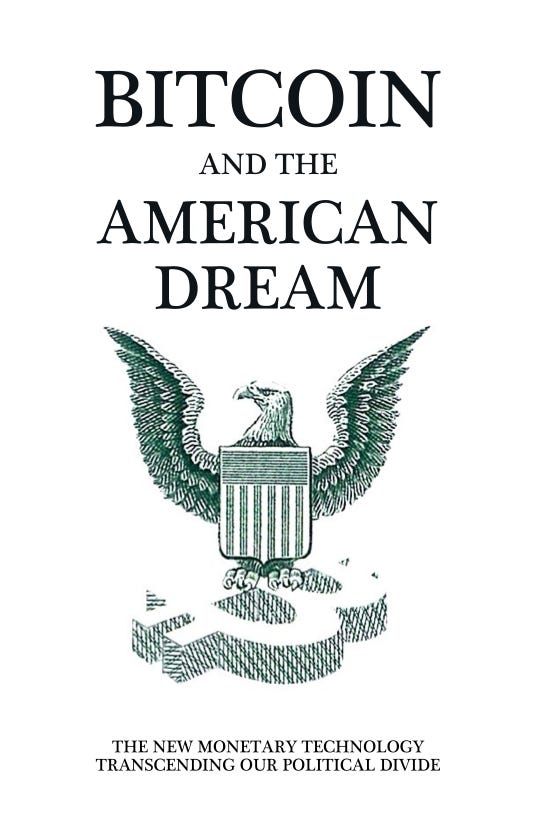Decentralization Requires Responsibility. Bitcoin Tech Talk #276
There’s been a recent trend of users being “de-platformed” moving to other platforms. Many have gotten banned from Twitter, so they’ll go to alternatives like Parlor, or Gettr or something else that’s similar. The sentiment is that this platform won’t ban them or add public notices (about COVID or election fraud) on their tweets. The problem, of course, is that there’s no guarantees and it’s very possible that they could get de-platformed from these new places. In addition, as Parlor found out, such platforms rely on other platforms which can de-platform them.
There are multiple layers of centralization in most internet applications. A modern internet service has many single-points-of-failure. The first and most obvious is the service itself. They have a terms of service and user agreement, which almost always have some vague language that amounts to “the company can ban users whenever they want”. But that’s not the only single point of failure. The cloud provider may ban the service. The DDoS prevention platform may ban the service. The DNS may refuse to service the service’s domain. The content delivery provider may refuse to service queries for that service. App stores may ban the app for that service. At the extreme, countries may ban the service from computers within their borders.
In a sense, there are many different platforms which a service relies on, any of which can, in essence, prevent access. Platforms, in other words, are centralized and they are choke points. Censorship can happen at any level because the data flows through these platforms and stopping the data from flowing means it’s no longer served.
The way to combat censorship is not to switch platforms, but to run your own server. A direct connection between server and client means there’s no central entity that can censor.
We see this in Bitcoin. Users run their own servers called nodes, which allows them to transact with whichever nodes they wish. The act of running your own server is what prevents the censorship of transactions. If we had to submit our transactions to a central place, then that place would be able to censor and could potentially use that power to rent-seek.
Fiat money, on the other hand, is very centralized and only authorized transactions go through. Banks typically sit in the middle and are, by law, required to check that they collect information about certain transactions on behalf of government. As compensation, they often get advantages which allow them to get very rich without adding much value.
In other words, the US dollar system is really a platform, with all the benefits and drawbacks of centralization. The main benefits are that it’s generally pretty fast, convenient and reliable. The drawbacks are financial censorship, money printing, burdensome regulation and much more. Bitcoin fixes the drawbacks, and as a tradeoff it’s not quite as fast, as convenient or as reliable as the US dollar infrastructure.
When we think about the tech platforms, the same tradeoffs are present. Think about email, for example. Gmail is fast, convenient and reliable. Gmail is also much less private and your data can be held hostage when you’re using too much space on their servers or they mistaken your account as a bot. Running your own email server means more privacy and less vulnerability to their mistakes and/or extortion, but also means it’s probably going to be slower, less convenient and less reliable.
This is the tradeoff of platforms. If we take charge of our own data, then we have to be willing to take the responsibility that comes with it. For email, that responsibility is running an email server. What people want is all the reliability, convenience and speed of a centralized platform with all of the privacy, uncensorability and sovereignty of a decentralized server. They want to have their cake and eat it too.
Indeed this is what altcoins capitalize on. They are described as platforms because they’re centralized, yet claim all the benefits of decentralized systems. In reality, it’s all the unreliability, inconvenience and slowness of decentralization with the lack of privacy, censorability and cheapness of centralization. They pretend users can have their cake and eat it too while taking advantage of them through massive rent-seeking.
Reality requires tradeoffs. Either you trust a centralized platform and get all the drawbacks of centralization, like their ability to sell your data, or you pay for your own server. Freedom does not come for free. Responsibility is the other side of freedom and that has a cost. Until we’re willing to pay that cost, there is no freedom to be had, just new platforms that can do with us what they want.
Bitcoin
Luke-jr reviews OP_CTV. The review of the BIP is interesting, but the activation method is what got my attention. Luke remains strongly opposed to BIP9 activation and gave a hard NACK, or rejection of this part of the proposal. The Speedy Trial part is interesting as the LOT=True or LOT=False debate will surely come back. My sense is that this proposal will be more controversial than Taproot, so activation methods and such will matter even more than it did on Taproot.
Jameson Lopp explores why sync times took longer in 2021 than in 2020. He wrote a crawler, he examined timeouts, looked at latency and upload bandwidths and determined that bandwidth is just slower because most people are using ISPs, which generally have lower upload bandwidth. There’s also the possibility that many connections end up in a loop to try to download blocks but ending up not being able to. His conclusion is that it’s a minor annoyance. The post shows why nodes need low requirements.
Suredbits explains how Taproot funds in one particular output were actually burned. It turns out that the taproot output had a public point (really, just the x-coordinate) that was invalid, but the network accepted it and the output is no longer spendable. It may seem that the logical thing to do would be to make such outputs not transmit, but then there’s an attack where batched outputs could be stalled by a single user who sends to one of these unspendable addresses.
CoinKite has two new products, TapSigner and SatsCard. Both use NFC, the first to sign a transaction and the second to be something like an OpenDime. They’ve essentially done something that’s like a hardware wallet, but using Near-Field Communication instead of, say, QR codes or SD cards. I don’t know the NFC spec, but this seems like a pretty solid way to make off-line signing work and the fact that these are in a card form factor makes it much easier to organize and manage.
Lightning
PlebPay is a simple paywall using Lightning. Here is a quick demo. I’m surprised no one has really done this yet with Lightning, as this seems like an obvious way to deliver digital goods. Selling a pdf book, software license or an mp3 song would seem like ideal use cases for something like this. Of course, this requires a server that can serve up the content, so perhaps that’s the limitation.
SimpleLightning is a newsletter for LN development. This is a more technical newsletter than your typical LN newsletter as it goes through individual pull requests, much like Bitcoin OP Tech is for Bitcoin. I’ve subscribed and encourage you to, as well.
SatsSales is a lightweight personal Bitcoin and lightning payment acceptance software. This is much more lightweight than, say, BTCPayServer and for that reason has some benefits. I love that there’s something you can just throw on based on a Lightning node that you run already. I hope they continue to develop this software for usage by plebs.
Economics, Engineering, Etc.
Grant Gilliam explains why Ten31 is investing in Bitcoin Infrastructure companies. The main argument is threefold. First, for any non-100% BTC portfolio, Bitcoin companies present a different risk/reward tradeoff. Second, some Bitcoin companies can outperform Bitcoin. Third, Bitcoin companies are not as volatile as Bitcoin is. The argument makes a lot of sense from a capital allocator perspective and we’ll see how this thesis works in a world of post-modern investing.
Lyn Alden eviscerates ESG. As she states, so much of what passes for being beneficial to ESG is really only virtue signaling with little to no actual impact. Her main point is that such virtue signaling is essentially a tax on production as a company can be ESG compliant without actually doing real good. In that sense, ESG is really a government regulation in a different form, enforced through VCs who are really just bankers at this point.
Stephan Livera opines on being a digital nomad on Bitcoin. He lays out the pros and the cons pretty fairly, going through why someone might want to do this and why someone may not. He also has some real practical tips on living on Bitcoin and getting work done. The post is a great resource for those that want to travel and explore the world a bit more than they have and it’s something I’ll be referencing in the years to come.
Milo is a way to get a mortgage using Bitcoin. The details are a bit fuzzy, but the main idea is that you’d be able to get a low-interest mortgage using Bitcoin as collateral. What the actual rates would be and how long the terms would be are still open questions. That said, this is a nice way to not have to sell your Bitcoin while still owning a place. I’m glad there are companies that are making stuff like this available, though for me personally, I generally like to stay away from leverage and debt.
Tantra Labs is closing down operations. This is one of many Bitcoin interest bearing account providers, who, if you custody BTC with them will return some percentage interest in Bitcoin. The company apparently operated on the assumption that the GBTC premium would stay high forever, which hasn’t been true for almost a year now. As a result, they’re going to be shutting down. I’ve always thought services like this were too good to be true and as far as results go, this one didn’t end nearly as badly as it could have. As we say in this space, not your keys, not your coins.
There are some interesting pieces of art on the blockchain, and no I’m not talking NFTs. These are ASCII art embedded in OP_RETURNs.
Quick Hits
You can store your seed phrase for 10,000 years or more using this.
Google is dipping its toes into Bitcoin. And so is Intel.
Another week, another exchange gets hacked.
Another week, another centralized altcoin is stalled.
Another week, more altcoins are shown to have major security flaws.
Events
Bitcoin and the American Dream book launch is happening in Washington DC on February 10th. Come join me and meet the authors as well as some influential DC people for the event!
I am in London for Advancing Bitcoin March 3-4. I am also going to be at Bitcoin 2022 in Miami April 6-8.
I’ll also be doing the Programming Blockchain seminars in London March 1-2 and Miami April 4-5.
Podcasts, Etc.
On this week’s Bitcoin Fixes This, I talked to Mike Peterson about Bitcoin Beach. We talked about the changes he’s seen there the past few years, how he thinks it led to the adoption of Bitcoin at the nation level and how it’s changing the Salvadoran identity.
I read through last week’s newsletter which you can find here.
I talked to Max Keiser on Keiser Report about my impressions of El Salvador. I am also in a documentary about Bitcoin FUD. Here is the latest book which is out now!
My other books are here and here.
Unchained Capital is a sponsor of this newsletter. I am an advisor and proud to be a part of a company that’s enhancing security for Bitcoin holders. If you need multisig, collaborative custody or bitcoin native financial services, learn more here.
Fiat delenda est.









